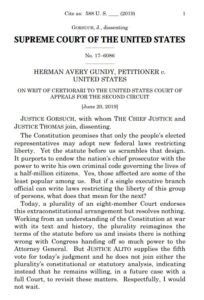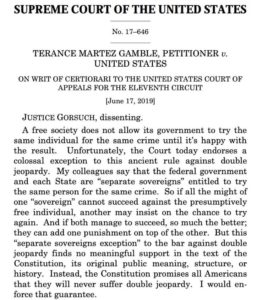Crossing to join his four liberal colleagues, Justice Neil Gorsuch wrote the opinion in yesterday’s Davis v. U.S., finding unconstitutionally vague a federal sentence-enhancement provision prescribing “harsher penalties for those who use guns ‘in connection with certain other federal crimes.'” [Jack Rodgers, Courthouse News] His opinion begins:
In our constitutional order, a vague law is no law at all. Only the people’s elected representatives in Congress have the power to write new federal criminal laws. And when Congress exercises that power, it has to write statutes that give ordinary people fair warning about what the law demands of them. Vague laws transgress both of those constitutional requirements. They hand off the legislature’s responsibility for defining criminal behavior to unelected prosecutors and judges, and they leave people with no sure way to know what consequences will attach to their conduct. When Congress passes a vague law, the role of courts under our Constitution is not to fashion a new, clearer law to take its place, but to treat the law as a nullity and invite Congress to try again.
It was the third rights-of-the-accused case this term in which Gorsuch took the liberal side, and put him at odds once again with Justice Brett Kavanaugh. In his dissent yesterday, after crediting tougher federal laws with at least partial responsibility for the drop in crime since the 1980s, Kavanaugh noted that the sentence enhancement has been applied without seeming difficulty in thousands of cases of violent offenses since its enactment:
The Constitution’s separation of powers authorizes this Court to declare Acts of Congress unconstitutional. That is an awesome power. We exercise that power of judicial review in justiciable cases to, among other things, ensure that Congress acts within constitutional limits and abides by the separation of powers. But when we overstep our role in the name of enforcing limits on Congress, we do not uphold the separation of powers, we transgress the separation of powers….
The Court usually reads statutes with a presumption of rationality and a presumption of constitutionality.
While both were appointed by President Trump, Gorsuch and Kavanaugh have been anything but in lockstep.


